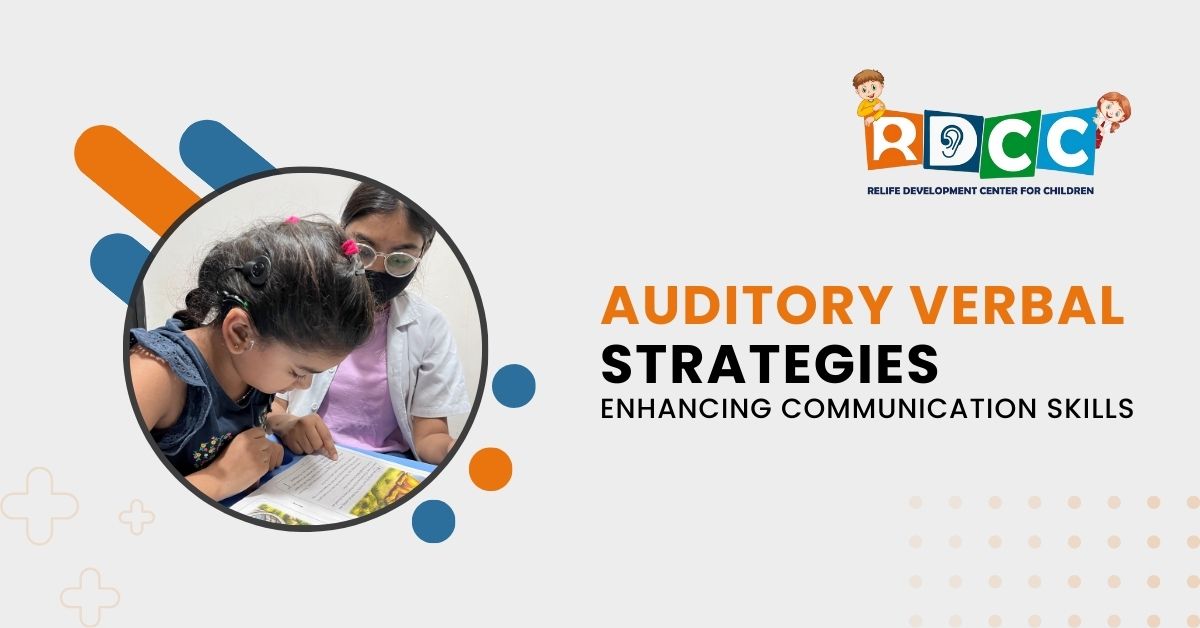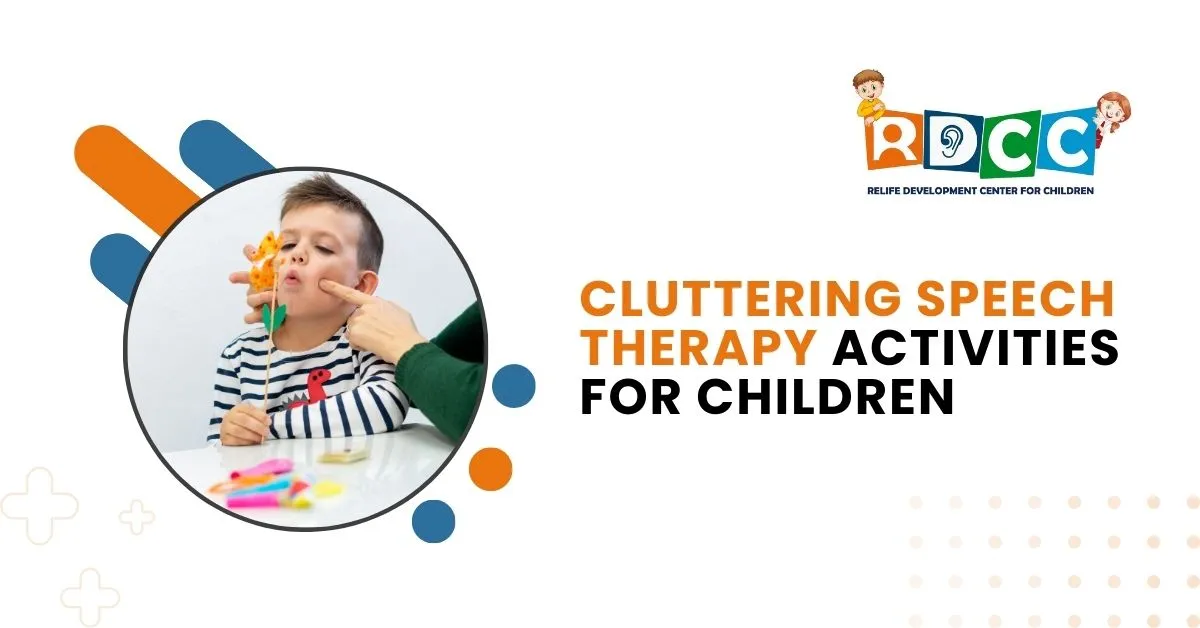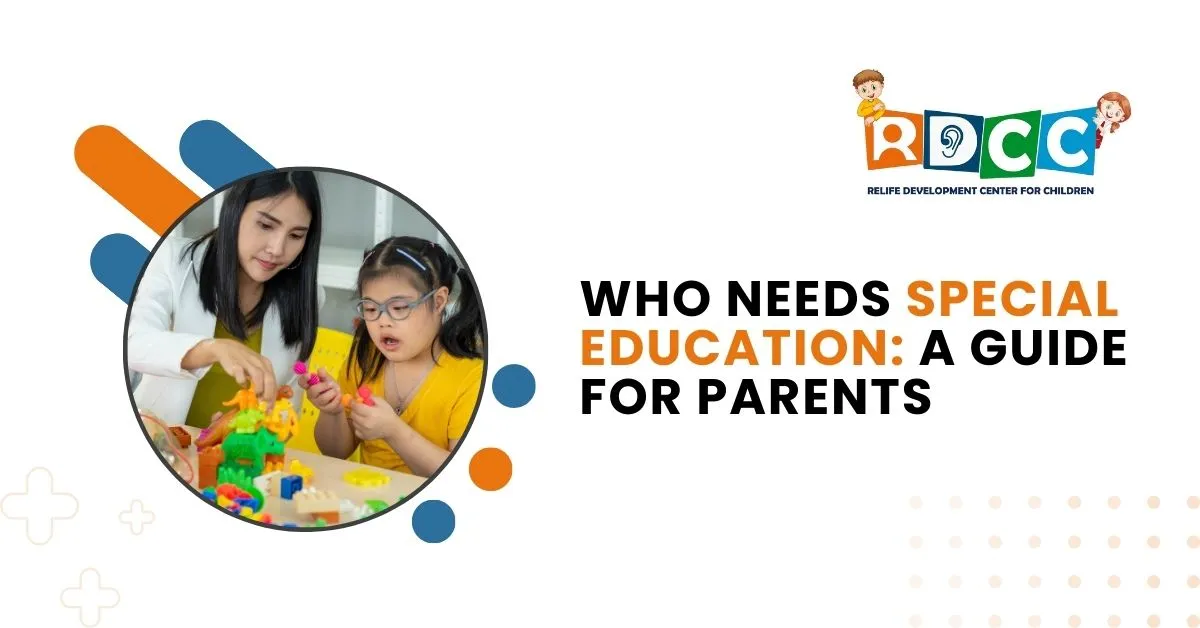
At RDCC Healthcare, Vadodara’s Leading Child Development Centre, we recognize the crucial role of effective communication skills for children with hearing impairments. Auditory Verbal Therapy (AVT) is a specialized approach designed to develop Listening and Speaking Abilities using Residual Hearing. This blog Explores various Auditory Verbal Strategies and their Impact on Enhancing Communication Skills for Children.
What is Auditory Verbal Therapy (AVT)?
Auditory Verbal Therapy (AVT) is a unique program that focuses on teaching children with hearing impairments to listen and speak through their residual hearing. By maximizing a child’s hearing potential, AVT helps them integrate into mainstream educational and social environments. The Therapy involves Intensive Listening Practice, Structured Activities, and Active Parental Involvement.
Key Auditory Verbal Strategies
Consistent Auditory Input
Providing Children with consistent exposure to clear and meaningful speech sounds aids in developing their auditory pathways. This involves Speaking Slowly, Clearly, and at a Moderate Volume.
Auditory Highlighting
Emphasizing certain sounds or words during conversation helps Children Identify and Understand them Better. This technique includes varying the Pitch, Volume, and Duration of Specific Sounds.
Acoustic Highlighting
Using Different Tones and Rhythms to highlight Speech Sounds makes it Easier for Children to differentiate between them, helping them Recognize the Nuances of Spoken Language.
Effective AVT Activities
Listening Games: Engaging Children in Games that require Listening and Following Instructions improves their Active Listening Skills. Examples include “Simon Says” and “Musical Chairs.”
Sound Identification: Encouraging Children to Identify and Differentiate between Various Environmental Sounds enhances their Auditory Discrimination Skills. This can be done through Sound-based Puzzles and Matching Games.
Reading Aloud: Reading Books aloud to Children with Clear Articulation and Expression significantly improves their Listening and Speaking Abilities. It also helps expand their Vocabulary and Comprehension Skills.
AVT Training Steps
Initial Assessment: Assessing a Child’s Hearing Level, Speech Abilities, and Individual Needs forms the Foundation of AVT. This involves Collaboration between Audiologists, Speech Therapists, and Parents.
Customized Therapy Plan: Developing a Personalized Therapy Plan tailored to the Child’s Specific Needs and Goals ensures Effective Progress. The Plan includes Structured Activities, Exercises, and Regular Assessments.
Parental Involvement: The Active Participation of Parents in the Therapy Process is Crucial. Parents are trained to incorporate AVT Techniques into Daily Routines, providing Consistent Auditory Input and Practice.
Frequently Asked Questions
How Does AVT Benefit Children with Hearing Impairments?
AVT helps children with hearing impairments develop listening and speaking abilities, which enables them to integrate into mainstream educational and social environments. It improves their communication skills, boosts self-esteem, and fosters emotional growth.
What are Key Auditory Verbal Strategies?
Key Auditory Verbal Strategies include consistent auditory input, auditory highlighting, and acoustic highlighting. These techniques ensure that children receive clear and meaningful speech sounds, helping them to understand and recognize the nuances of spoken language.
What Activities are Involved in AVT?
Effective AVT activities include listening games, sound identification, and reading aloud. These activities engage children in listening and following instructions, enhancing their auditory discrimination skills, and expanding their vocabulary and comprehension.
How can Parents Support their Child’s AVT at Home?
Parental involvement is crucial in AVT. Parents can support their child’s therapy by incorporating AVT techniques into daily routines, providing consistent auditory input, and practicing structured activities at home. Regular collaboration with audiologists and speech therapists is also important.
Is AVT Suitable for All Children with Hearing Impairments?
AVT is suitable for many children with hearing impairments, but it is essential to assess each child’s hearing level, speech abilities, and individual needs. Consulting with audiologists and speech therapists will help determine if AVT is the right approach for a particular child.
How Does RDCC Healthcare Support AVT?
At RDCC Healthcare, Vadodara’s Leading Child Development Centre, we offer personalized AVT programs tailored to each child’s unique needs. Our expert therapists work closely with parents to provide a supportive and engaging environment for children to develop their communication skills.
What are the Steps Involved in AVT Training?
AVT Training involves an initial assessment of the child’s hearing level and speech abilities, developing a customized therapy plan, and active parental involvement. Regular assessments and structured activities are integral parts of the therapy process to ensure effective progress.
Conclusion
Auditory Verbal Therapy (AVT) is a powerful approach to enhancing Communication Skills in Children with Hearing Impairments. At RDCC Healthcare, Vadodara’s Leading Child Development Centre, our Expert Therapists provide Personalized AVT Programs that cater to each Child’s Unique Needs. Through Consistent Practice, Structured Activities, and Active Parental Involvement, we strive to maximize each Child’s Auditory Potential and help them achieve their Communication Goals. For More Information on our AVT Programs, Contact RDCC Healthcare Today.




